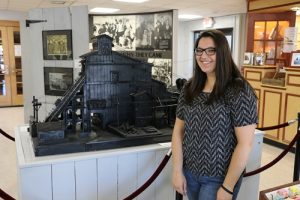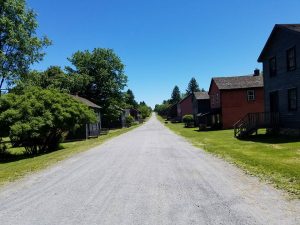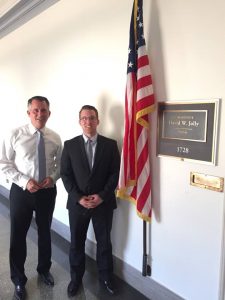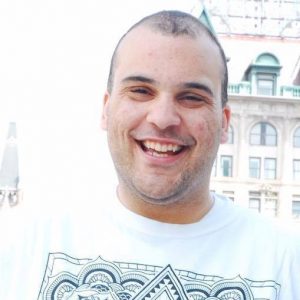 My name is Alexander Lester, and this summer I’m interning with the National Federation of the Blind’s Jacobus tenBroek Library.
My name is Alexander Lester, and this summer I’m interning with the National Federation of the Blind’s Jacobus tenBroek Library.
When I arrived two days ago, I wasn’t sure what to expect. As I approached the NFB’s giant city block building I felt anxiety. I travel a lot, so going to strange places usually relaxes me. However, my fears and anxiety have been completely relieved and I have been absorbing an insane amount of information from the the rich history of this organization. I have been exposed to different aspects of our world.
In addition, I have met some amazing people. There are four other interns, all of whom are Blind. Since you don’t know me, I guess I should note I am sighted.
As a philosophy major, my social circle consists of people that may be considered eccentric or esoteric, so I was a bit worried to be in a business environment, fearing I would have to refrain from talking about the obscure authors that consume my mind, and my kindle library. Luckily, it just so happens that one of the four interns is a fellow Philosophy major (who I will admit is better read than I am), and even though he is from an analytic program, I won’t hold it against him (for reasons noted below). The two of us have already had some pretty good discussions. One topic we discussed was how his department chair was willing to wave the Logic requirement of his degree because the professors didn’t know an effective way to express derivation with symbolic quantifiers. Parts of Logic are dependent on visual constructs. Being blind, he didn’t have access to certain constructs as a sighted person would. With the goal of working as a professor in the future, this wasn’t acceptable to him. When he was stonewalled by his philosophy professor, someone supposedly dedicated to acquiring and teaching knowledge, he contacted the world’s top leading 20 logician’s to find out how to master the material. One of the emails he sent was published on a popular blog in the philosophy community called the Leiter Reports Philosophy Blog. The following text is his email, with edits suggested by the intern:
“I am a blind [sic]—philosophy Undergraduate student. As it stands, in order to achieve a B.A. in Philosophy, my University requires that I take a course in Logic. Moreover, my personal education goals include achieving a doctorate in philosophy; therefore, I believe this requirement is pivotal for my success in the field.
Being Blind [sic], I foresaw some issues with the more visual aspects of Logic; namely the symbolic representation of statements. My department recommended I audit the course, in order to observe the possible accessibility requirements for the course. I audited the class this past spring and found no issues up until we got to natural deduction. I have little to no sight. The common solution which has been discussed is to get the degree requirements changed or to receive a course replacement; however, because I was able to successfully understand and utilize the theoretical aspects of Logic, I do not find this to be an adequate solution.
My question, then, is there a way that you have either utilized in the past—if you have had a blind student—to make the course more accessible or is there something my professor may be able to do to help?” (Leiter Report)
According to him, this lead to his department head taking a lot of heat from the Philosophic community for not trying to learn how to effectively teach the material.
I believe it was an interesting lesson for all involved and as an ethicist it hit home with me. Initially, I only thought about the surface level obstacles for him while studying philosophy such as reading texts (which are mostly available in audio format) and writing (which he is able to do via a computer with audio software); but also learning proofs – something that is sacred to the analytic philosopher – are also central to the discipline. The reality is, without knowing Logic (conveyed through these visual constructs), much of philosophy is not accessible. It astonishes me that his professor thought it was okay to deny somebody who is pursuing a major in philosophy the tools needed to do a majority of it. That’s beyond me.
I am excited to see a thinker rise above opposition in pursuit of the good life. Yes, sight is helpful when learning philosophy, but that doesn’t have to stop non-sighted people from effectively learning Logic, or actively and thoughtfully wrestling with many of the world’s most important questions.
I am grateful for having met this intern. As it’s a reminder to both myself and others to see what it means to be a Philosopher, someone who is a lover of wisdom; one that will seek the truth no matter the obstacle, for the sake of the truth. In eight years, when I hope to be the one teaching Logic, I will remember this conversation and I will actively do my best to solve the challenges of my students, both blind and sighted. No student should be denied tools that are vital to clear thinking and living the good life.
References:
“Advise for Teaching Logic to a Visually Impaired Undergraduate?” ‘Leiter Reports: A Philosophy Blog’ N.p., n.d. Web. Accessed 08 June 2016.

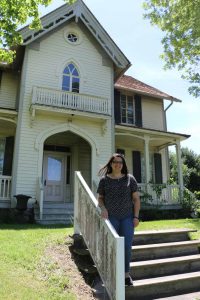
![Getting home work done! [ Photo of my MacBook Air next to a Starbucks Strawberry Acai refresher on a rustic looking table ] photo 13406747_147259652358282_8286785439219013627_n_zps3lxmyw9e.jpg](http://i665.photobucket.com/albums/vv14/Armchair_Phil/Facebook/Mobile%20Uploads/13406747_147259652358282_8286785439219013627_n_zps3lxmyw9e.jpg)
